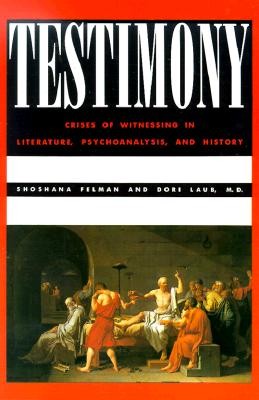| Testimony: Crises of Witnessing in Literature, Psychoanalysis and History Contributor(s): Felman, Shoshana (Author), Laub, Dori (Author) |
|
 |
ISBN: 0415903920 ISBN-13: 9780415903929 Publisher: Routledge OUR PRICE: $54.10 Product Type: Paperback - Other Formats Published: December 1991 Annotation: "To write poetry after Auschwitz is barbaric," wrote Austrian musicologist Theodor Adorno. Indeed, the damage done to our sense of beauty, our sense of history and proportion by the events of World War II and the Holocaust is profound. Traditional means of assessing and narrating human experience have failed to encompass and account for that historic trauma, and yet it is necessary to speak about these events if we are to heal their rupture of history. But how can we tell these stories? What is the consequence of testifying to that horror? What is the effect of bearing witness to such testimony? In this collaborative work, Yale literary critic Shoshana Felman and psychoanalyst Dori Laub examine the nature and function of testimony, witnessing, and memory in relation to the Holocaust. Defining, for the first time, the uniquely devastating aspect of the Holocaust as a radical crisis of witnessing--the "unprecedented historical occurrence of...an event eliminating its own witness"--the authors examine the crisis of history and literature it has prompted. Through close analyses of major postwar literary texts, films, and documents--including Camus' novels, de Man's essays, the poetic projects of Celan and Pagis, videotaped archival testimonies, and Claude Lanzmann's film, "Shoah" --the authors explore the ways in which the traumatic consequences of the Holocaust continue to reverberate and evolve in contemporary art, politics, and culture. Felman and Laub draw on their personal experiences receiving survivors' accounts to present the first "theory of testimony": a radically new conception of the relationship between art and culture and the witnessing of historical events.Felman and Laub argue that in addition to the critical practice of the contextualization of the text, we must begin to textualize the context: to "read" the events of history and culture as part of literary and artistic production. Giving particular attention to the analysis of literary and artistic productions, the authors bring to light the crisis of literature as a consequence of the war. Felman provocatively compares the war-time and post-war writings of de Man and Camus, revealing a parallel transformation in the authors' works as each moves from an idealistic faith in his ability to bear witness to a radical disillusionment with language and the act of witnessing. Deftly avoiding the pitfalls of much current critical discourse, Felman and Laub subtly and persuasively employ critical literary and psychoanalytic theory to open new discursive spaces rather than to distance theory from experience. Appropriately, then, "Testimony" closes with an analysis of Claude Lanzmann's brilliant film, "Shoah"--a work, like "Testimony" itself, which liberates language and the witness through its self-conscious pursuit of the historically unspeakable and its retrieval of "the livingvoice." |
| Additional Information |
| BISAC Categories: - Literary Criticism | Semiotics & Theory |
| Dewey: 801.92 |
| LCCN: 91-32891 |
| Physical Information: 0.65" H x 5.92" W x 9.02" (0.93 lbs) 312 pages |
| Descriptions, Reviews, Etc. |
| Publisher Description: In this unique collection, Yale literary critic Shoshana Felman and psychoanalyst Dori Laub examine the nature and function of memory and the act of witnessing, both in their general relation to the acts of writing and reading, and in their particular relation to the Holocaust. Moving from the literary to the visual, from the artistic to the autobiographical, and from the psychoanalytic to the historical, the book defines for the first time the trauma of the Holocaust as a radical crisis of witnessing the unprecedented historical occurrence of...an event eliminating its own witness. Through the alternation of a literary and clinical perspective, the authors focus on the henceforth modified relation between knowledge and event, literature and evidence, speech and survival, witnessing and ethics. |